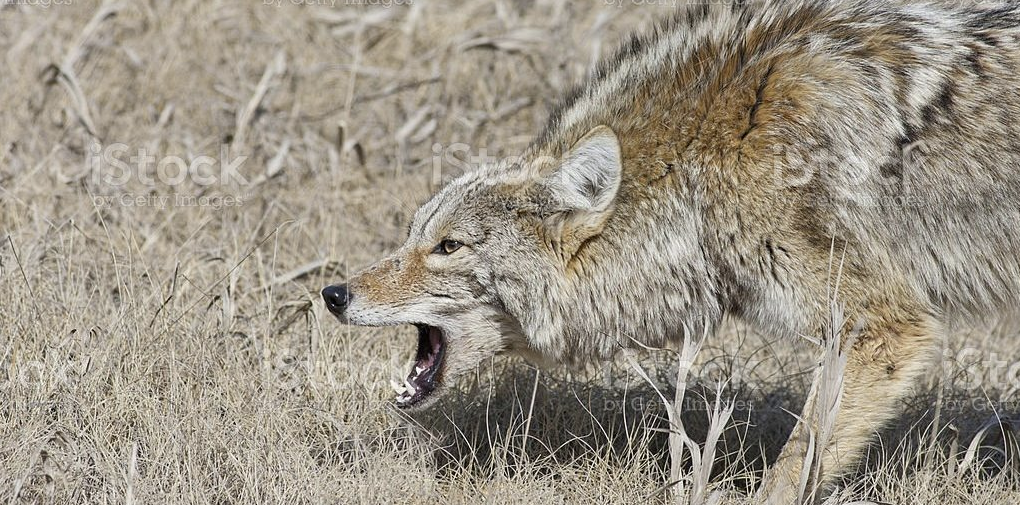Unprovoked coyote attacks have sent two Burlington residents, including a toddler, to hospital this week.
The first attack was on an adult woman on the Centennial Multiuse Trail at Seneca Ave. in the morning. The coyote jumped and bit her from behind.
The second attack was on a male toddler in his fenced backyard. There was no food or small animals to attract the coyote. The toddler was also bit in the back of the neck.
Both victims were treated at Joseph Brant Hospital and released.
According to a spokesperson, the suspected coyote has been located and tracked. The City has teamed with the Ministry of Natural Resources and Forestry, Halton Regional Police, and a licensed wildlife trapper for a coordinated, urgent response to eliminate the coyote.
“We are devastated by this news and are leaving no stone unturned to ensure this doesn’t happen to anyone else,” said Burlington Mayor Marianne Meed Ward..
“We have secured the services of a trapper to track and euthanize the coyote identified. It is very unusual for coyotes to attack, so we are also looking to understand what prompted this particular coyote to attack a person. As well, we’re taking proactive steps to identify any other coyote that may be at-risk.
“In the long-term, we are exploring a number of options related to coyote management, some suggested by residents, and we will provide more information to the community as it becomes available.”
The City is responsible for taking appropriate actions to manage resident encounters with coyotes. On the rare occasion a coyote attacks a person, the City has a protocol in place that is currently being followed.
Anyone who sees a coyote is encouraged to let the City know by calling 905-335-3030 or filling out a report online. Reporting coyote sightings, or potential problems related to overgrown building sites, garbage or someone intentionally or accidentally feeding a coyote, helps the City monitor the location and activity of coyotes in the community.
Coyote sightings are common in the City of Burlington, as our green spaces and forested areas provide an excellent habitat for them. While coyotes will generally avoid humans, they can pose a serious threat to pets, such as cats and small dogs.
Coyotes naturally fear humans and should remain wild animals with little human interference. They play an important role in balancing the ecosystem in southern Ontario by controlling the populations of rabbits, rats and mice.
Residents can take these steps to help reduce the risk of potential coyote conflicts.
Never feed coyotes: Feeding coyotes, directly or indirectly, teaches them to depend on human handouts and can cause them to become too familiar with humans. This familiarization can lead to aggressive behaviour around people and pets.
Never leave pets unattended: Coyotes may see pets as a threat to their territory and may attack, especially when there is a den site nearby. Always keep dogs on a short leash (less than six feet long) when walking outdoors and avoid retractable leashes. Make sure your cats and dogs are not unattended, especially at night, even in your fenced backyard.
Keep a tidy property: Residential neighbourhoods are an ideal coyote habitat with access to water, shelter and food sources like garbage, pet food, fruit tress and birdfeeders. Make sure your property is tidy and clear of garbage, food, brush, long grass and wood piles which are ideal den sites for coyotes or other wild animals that attract coyotes.
Inspect your property: Make sure spaces around and under decks, sheds and similar structures are closed off with wire screening that extends at least 20 centimetres under the ground.
Consistently haze coyotes: Deterring coyotes takes vigilance. Consistent efforts by the entire community to haze coyotes can help to re-instill their fear of humans and discourage unwelcome behaviour.
Use one or more of these hazing techniques every time you see a coyote to help move it out of a residential area:
- Yell loudly
- Wave your arms and make yourself look as big as possible
- Use air horns, whistles, bang pots
- Throw small rocks, large sticks, cans and/or rubber balls at the coyote
- Spray the coyote with water from a garden hose or a water gun filled with vinegar
If a coyote approaches, residents are reminded to:
- Stop. Don’t run.
- Pick up small children and pets
- Stand as tall as you can
- Make noise, be as loud as you can, shout “go away”
- Wave your arms and stomp your feet
- Use hazing techniques
- Back away slowly
- Call Burlington’s Animal Services at 905-335-3030 if you see an aggressive, sick or injured coyote
- Call 9-1-1- if a coyote poses an immediate threat or danger to public safety.

